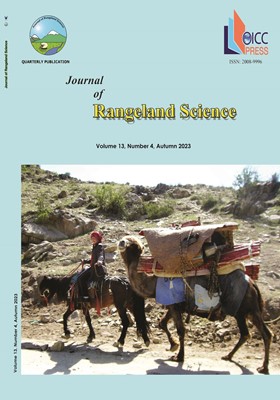Effectiveness of Range Management Plans in Middle Zagros Region from Viewpoint of Rangeland Experts
محورهای موضوعی : Socio-Economics
Mehrdad Baharvandi
1
,
Nourollah Abdi
2
![]() ,
Abbas Ahmadi
3
,
Hamid Toranjzar
4
,
Saeed Gholamrezai
5
,
Abbas Ahmadi
3
,
Hamid Toranjzar
4
,
Saeed Gholamrezai
5
1 - Ph.D. Student, Natural Resources and Environment Department, Islamic Azad University, Arak, Markazi, Iran
2 - Associated Professor, Department of Natural Resources, Arak branch, Islamic Azad University, Arak, Iran
3 - Assistant Professor, Department of Natural Resources, Arak branch, Islamic Azad University, Arak, Iran
4 - Assistant Professor, Department of Natural Resources, Arak branch, Islamic Azad University, Arak, Iran
5 - Associated Professor, Department of Rural Development, Faculty of Agriculture, Lorestan University, Khorramabad, Iran
کلید واژه: nomads, Participation, Zagros Rangelands, Grazing license,
چکیده مقاله :
Assessment of Range Management Plans (RMP) enables policy makers and governmental planners to understand their impact from different environmental, social, human, and economic aspects in order to improve future planning. The purpose of the present study was to explore the effective variables on RMP in Middle Zagros Mountain in Lorestan, Ilam, Kurdistan, and Kermanshah provinces, Iran in 2018. Data were collected using a structured interview technique and questionnaires (N=140) prepared in 6 sections and filled by rangeland experts of local offices of natural resources in four provinces. Seven factors were asked about weaknesses of range plans and 6 factors were asked for strengths of the plans. Result of the logistic unit (Logit regression) showed that the variables of lack of government credits (p≤0.01) and lack of continuous monitoring on the proper implementation of the project (p≤ 0.10) were negative while the variables of users’ participation in the implementation of RMP (p≤ 0.01) and specifying customary system for herders (p≤ 0.01), controlling herders’ grazing license (p≤ 0.10), the rate of acceptance of the rural municipality, Implementation of modifying and rehabilitation operations, establishing livestock and rangeland balance (p≤ 0.05), Intersection cooperation between the involved institutions and departments (p≤0.01) and rural council the range management projects (p≤ 0.05) were positively significant from the perspective of the experts. Also, 47% of experts were against renting rangeland to nomadic and non-rural nomad herders. They also suggested the implementation of RMP could be done in the divided rangelands rather than common form. In sum, the available projects and plans in the region under study area were not efficient due to technical, social, and economic problems. Hence, they need to be reviewed in this regard. It should be attempted to take into consideration the technical, social, and economic issues more seriously while preparing new projects.


